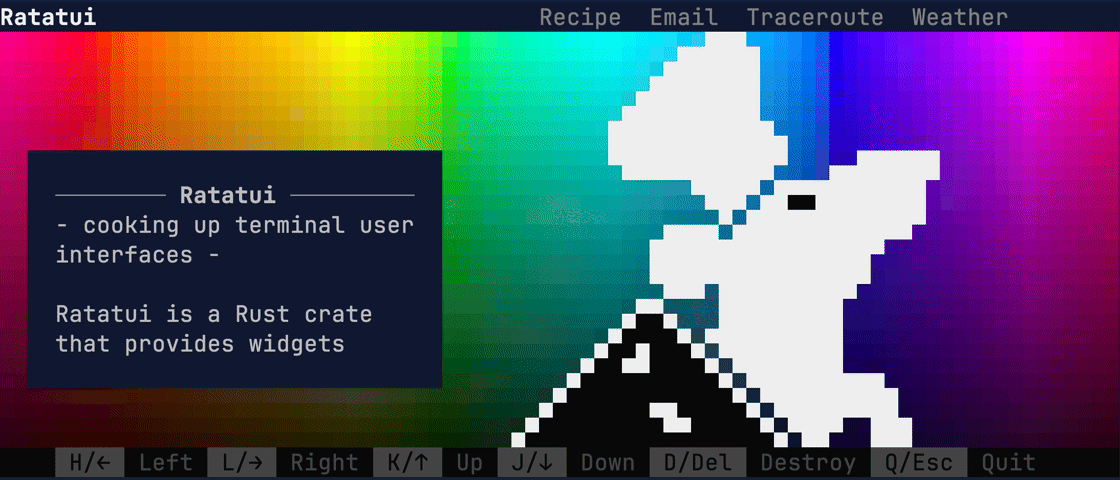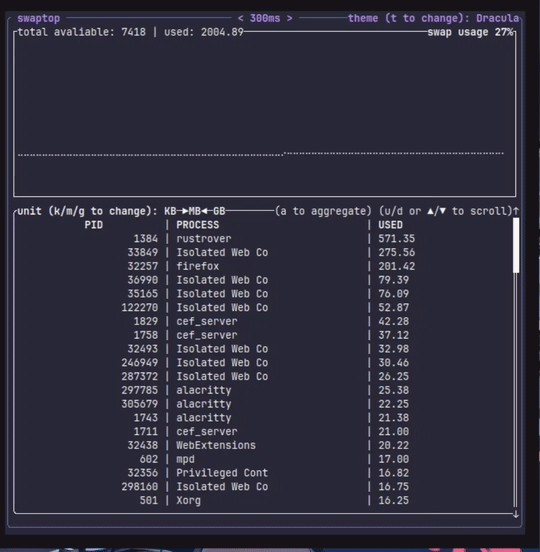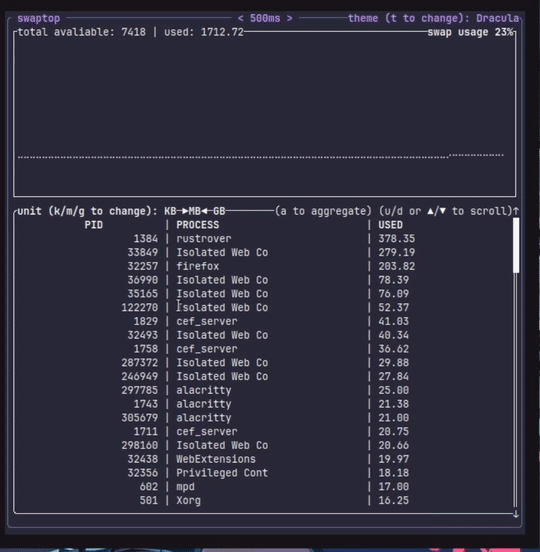You can find it at: https://github.com/luis-ota/swaptop/
Listen to Duvet - bôa while reading!
Intro
Recently I started studying Rust. It is a very cool language to understand complex concepts about computers and OS. It is considered a low-level language but it's actually very easy to learn and apply. I started the JetBrains Rust course via RustRover and learned a lot about how the language works and its syntax.
How I study and learn a new tech
After a few modules of the Rust course, I started to forget some of the initial concepts the course aborded. Normally this happens to me, so to reinforce what I learned, I created a simple project.
The problem to "solve"
Recently I started a new internship. The notebook I use there has only 8GB of RAM. Happily, I could use Linux, so I put 16GB of swap (as recommended swap = ram * 2) to avoid RAM problems, but my browser always got slow, probably because it was using only or mostly the swap.
To confirm I ran:
printf "%-8s %-20s %s\n" "PID" "NAME" "SWAP(kB)"; for pid in /proc/[0-9]*; do
statfile="$pid/status"
[ -r "$statfile" ] || continue
swap=$(grep VmSwap "$statfile" | awk '{print $2}')
[ "${swap:-0}" -gt 0 ] || continue
name=$(grep Name "$statfile" | awk '{print $2}')
printf "%-8s %-20s %s\n" "$(basename "$pid")" "$name" "$swap"
done | sort -k3 -nr
output
PID NAME SWAP(kB)
12425 pycharm 1191416
14180 spotify 348820
23869 firefox 170060
4407 chrome 169676
32631 chrome 168028
3631 gnome-shell 162048
6007 chrome 157044
14427 chrome 152376
19347 chrome 150880
4633 chrome 137444
14026 spotify 128768
5852 chrome 123128
5736 chrome 116508
24376 Isolated 97088
34630 chrome 85236
6591 chrome 84360
4462 chrome 78020
5546 chrome 74276
13954 chrome 70612
13925 chrome 68340
4884 chrome 67424
14198 chrome 62820
4929 chrome 62228
4634 chrome 61488
...
I could confirm: Chrome was using a lot of swap. There's not much I can do about it. The point was:
To find the command to show this output was not very easy, and once I had it I saved it somewhere, and as normally, I lost it.
So I thought, is there a tool to monitor swap?
I searched for a minute and then realized, why not make one?.
Inspiration
I love TUI tools in the Linux terminal. One of my favorites is btop. Btop is a very very very pretty TUI tool to monitor hardware usage in Linux. I use it every day. But the info about swap is very simple:

So my goal was: make a btop-like tool, but for swap
......... SWAPTOP!
The Start
First I learned how Linux logs the meminfo: /proc
As in the docs: https://docs.kernel.org/filesystems/proc.html
The proc file system acts as an interface to internal data structures in
the kernel. It can be used to obtain information about the system and to
change certain kernel parameters at runtime (sysctl).
So to get the info, I needed to learn the proc filesystem structure and read it, cluster it, etc. Yes, too complicated, or... not.
There's already a Rust lib to consume: procfs.
So the meminfo step was ok.
The Interface
As I said, I wanted it to be a TUI interface like btop, so I searched for libs in Rust to do it.
First I found tui-rs, then, ratatui, so I decided to use Ratatui...
Because, you know, Ratatui!

So the frontend and backend tools were there, now time to get hands on.
The development
- You can find the complete code at: https://github.com/luis-ota/swaptop/
Backend
I created some structs:
For the process lines:
#[derive(Debug, Clone)]
pub struct ProcessSwapInfo {
pub pid: i32,
pub name: String,
pub swap_size: f64,
}
For the chart:
#[derive(Debug, Clone, Default)]
pub struct SwapUpdate {
pub aggregated: Vec<ProcessSwapInfo>,
pub total_swap: u64,
pub used_swap: u64,
}
And then the functions:
pub fn get_processes_using_swap(unit: SizeUnits) -> Result<Vec<ProcessSwapInfo>, SwapDataError>{}
and
pub fn get_chart_info() -> Result<SwapUpdate, SwapDataError>{}
And some others for features like aggregating and changing the unit from KB, MB, GB, etc.
Interface
I started by using a Ratatui demo and went from there.
First I created a function to create the lines for the processes list and render it:
fn create_process_lines(&self, aggregated: bool) -> Vec<Line<'static>> {}
fn render_processes_list(&mut self, frame: &mut Frame, area: Rect, theme: &Theme) {}
And a function to render the chart (with a lot of help from DeepSeek...):
fn render_animated_chart(&mut self, frame: &mut Frame, area: Rect, theme: &Theme) {}
After a lot of struggle and trial and error and trying again...
It was there:

I added some features:
| Key | Action |
|---|---|
q/Esc | Quit application |
k/m/g | Switch units (KB/MB/GB) |
a | Toggle aggregate mode |
t | Cycle through themes |
↑/u | Scroll up |
↓/d | Scroll down |
Ctrl+C | Force quit |
< / > | Decrease / Increase interval |
Then some themes:

voilà! Swaptop!!!!
Conclusion
This project was a lot of fun to work and learn with. I learned some new concepts about Linux and Rust language. And I must say it, I fell in love with Rust. What a beautiful and great language it is. I will continue to study and create new projects with it.
Hope you enjoyed reading this post!